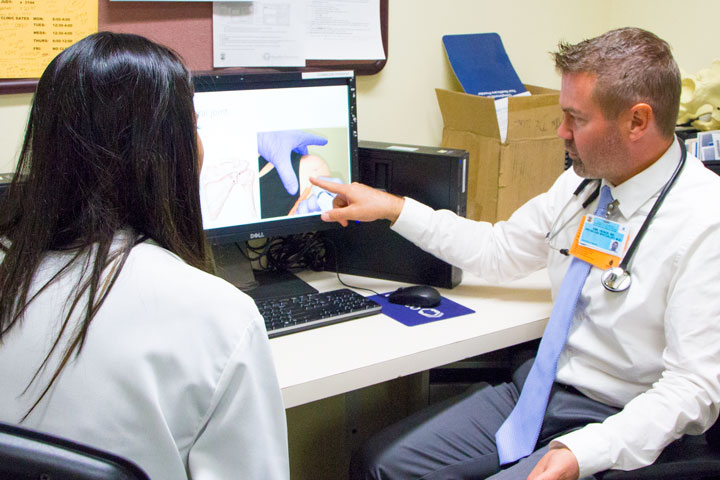Learn about our two-year clinical training program in Rheumatology.
Program Overview
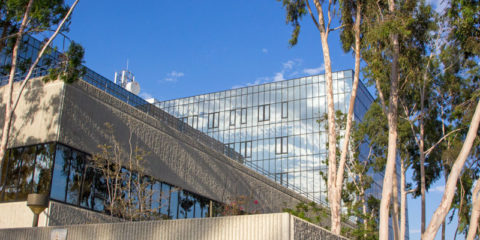 Olive View-UCLA Medical Center is a safety net hospital serving a patient population of incredible variety in culture, language, economic background, and medical problems. Patients encompass the full spectrum of connective tissue diseases, from infectious arthritis, rheumatoid arthritis, sero-negative spondyloarthropathies, systemic lupus erythematosus and systemic vasculitis to osteoarthritis, fibromyalgia, gout, pseudogout, and localized musculoskeletal pain conditions. We take care of an underserved population of over 2 million people in northern LA County that due to lack of regular medical access often present in late stages of undiagnosed disease. We attract and recruit fellows who are dedicated to serving this population and enjoy the challenge of discovering the initial diagnosis and implementing the treatment plan.
Olive View-UCLA Medical Center is a safety net hospital serving a patient population of incredible variety in culture, language, economic background, and medical problems. Patients encompass the full spectrum of connective tissue diseases, from infectious arthritis, rheumatoid arthritis, sero-negative spondyloarthropathies, systemic lupus erythematosus and systemic vasculitis to osteoarthritis, fibromyalgia, gout, pseudogout, and localized musculoskeletal pain conditions. We take care of an underserved population of over 2 million people in northern LA County that due to lack of regular medical access often present in late stages of undiagnosed disease. We attract and recruit fellows who are dedicated to serving this population and enjoy the challenge of discovering the initial diagnosis and implementing the treatment plan.
The program includes 3 weekly adult ambulatory arthritis clinics, a biweekly pediatric rheumatology clinic, and a weekly musculoskeletal injection procedure clinic. We have approximately 5,000 patient visits yearly and an inpatient service with approximately 400 rheumatology consult admissions annually. The inpatient and outpatient services at Olive View-UCLA Medical Center are outstanding resources for clinical training and research. Trainees will develop clinical expertise in performing rheumatological procedures, including aspirating and injecting joints, soft tissue injections, and musculoskeletal ultrasound. All training is closely supervised by dedicated faculty in a congenial environment.
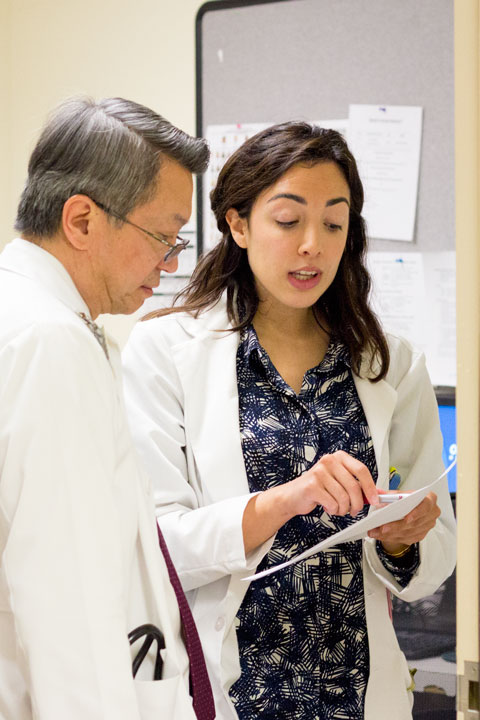
Clinical research experience at Olive View-UCLA Medical Center can involve health services and outcomes studies, arthritis empowerment programs, scleroderma research and clinical trials. Additional clinical and/or basic science research laboratory collaborative opportunities are available through the Division of Rheumatology at Ronald Reagan-UCLA Medical Center.
The Rheumatology Fellowship Program is a dynamic clinical and research program with over a 30-year history of training outstanding board-certified rheumatologists. This program has 3 full-time faculty, 1 part-time clinical faculty, and a large network of volunteer attending rheumatologists. Clinical rotations also include training in orthopedics, physical therapy, and pediatric rheumatology. The strong didactic teaching program includes clinical and basic science core curriculum seminars, clinical journal clubs, radiology conferences, MSK US conferences, pathology conferences, and an emphasis on bedside teaching.
Curriculum
Conference
Rheumatology didactic conference occurs weekly on Thursday afternoon. This curriculum is modified on an annual basis to comprehensively cover diverse topics in rheumatology over the two year training period. Each year we begin with a four-hour joint injection workshop using joint injection models of knee, shoulder, and hand. In the first two months we also provide a “Nuts and Bolts” series covering the fundamentals of diagnosis and management of the most common diseases seen in rheumatology. This serves as a solid foundation for the first year fellow and reinforces these principles for the second year fellow. Each fellow prepares a monthly didactic talk on a variety of topics with an emphasis on pathophysiology, immunology, and molecular mechanisms of disease.
Journal Club
We have monthly journal clubs to learn to critically interpret the literature and provide an evidence based foundation for clinical decision making.
Additional Didactics
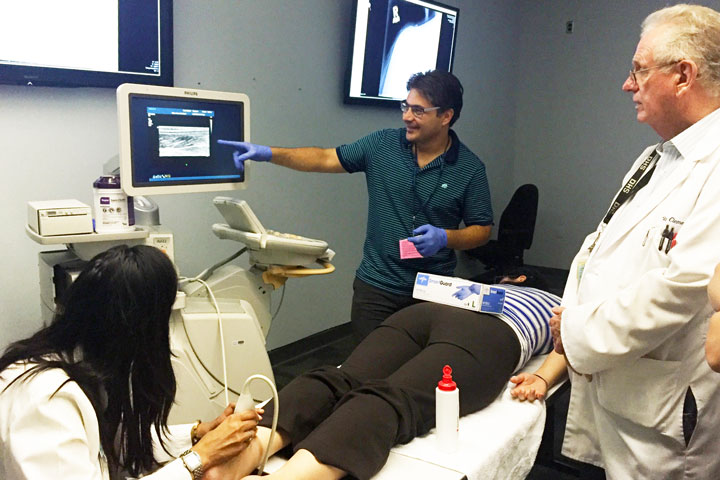 Twice monthly we meet with one of our MSK radiologists to review cases and do hands-on MSK ultrasound training. We incorporate board review modules, a pathology series, clinical topic reviews, and interdivisional conferences with nephrology and pulmonology. The diverse and comprehensive diseases managed by our fellows, augmented with the structured and intentional didactic series prepare our fellows to be outstanding and highly competitive clinicians, and has resulted in 100% first time board pass rate since the program’s inception.
Twice monthly we meet with one of our MSK radiologists to review cases and do hands-on MSK ultrasound training. We incorporate board review modules, a pathology series, clinical topic reviews, and interdivisional conferences with nephrology and pulmonology. The diverse and comprehensive diseases managed by our fellows, augmented with the structured and intentional didactic series prepare our fellows to be outstanding and highly competitive clinicians, and has resulted in 100% first time board pass rate since the program’s inception.
Patient Experience
We have 3 outpatient adult rheumatology clinics weekly including continuity clinics for each fellow and a weekly musculoskeletal injection procedure clinic. Fellows will be working alongside residents from the internal medicine program, medical students rotating from UCLA, and two nurse practitioners. Attending staffing is approximately 1 attending to 2-3 housestaff, allowing ample opportunity for bedside teaching. The inpatient consult service rounding occurs in the afternoon following clinics with one of the faculty rheumatologists. This allows for real-time procedures, management decisions, and bedside teaching to occur. An on-site pediatric rheumatology clinic occurs twice monthly, providing our fellows extensive exposure in managing this population. Additional education comes from close co-management with neighboring clinics including orthopedics, podiatry, ophthalmology, and dermatology. Finally, an on-site infusion center provides our fellows with experience in managing a variety of different complications that can occur during biologic infusions.
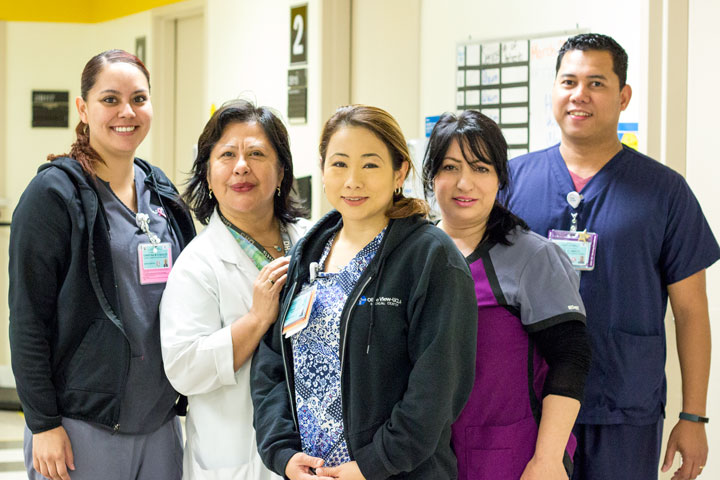
Salary & Benefits
The current annual salary for fellows in the program are:
- Post-graduate year 4 (first-year rheumatology fellow): $71,855
- Post-graduate year 5 (second-year rheumatology fellow): $74,796
There is an additional $1000/month housing allowance.
In compliance with the NRMP, you may view a sample of the type of contract you will be expected to sign if matched into our program. This is a sample UCLA contract for residents and fellows.
Sample Contract
In-service examinations in Rheumatology are provided by the fellowship training program.
Choosing Olive View
What Do Our Graduates Say?
-
- I really loved my time as a Rheumatology fellow at Olive View UCLA. The program has a very rigorous out-patient training, with tons of bread and butter patients, as well as the more intellectually challenging case, that more than prepared me for my current job at Kaiser. Also, the variety and severity of the pathology I saw in the in-patient setting is likely very hard to replicate in other non-county settings. I got the opportunity to do a lot of procedures which was great for me. I also really enjoyed the radiology and ultrasound teaching I had. And the best part of working at Olive View UCLA are the people you get to work with, the attendings, the other department colleagues, the clinic staff, and most of all, the patients.Richard Lau, MDRheumatologist, Kaiser Permanente Santa Clara
- Olive View-UCLA offers the benefits of County case variety and University academic excellence. Boasts rare case presentations on the inpatient service. Outpatient clinical care provides necessary preparation for community best practices. Excellent Subspecialty and Primary Care, Hospitalist services to coordinate overlap cases for additional expertise. This is a wonderful program that nurtures growth with academic collegiality to provide patient-centered care.Sue Chung, MD, FACPChief of Rheumatology, Facey Medical Group
- The clinical training received at Olive View is truly one of a kind and covers the full spectrum of rheumatologic disorders that one could hope to see in any fellowship program. By the time I was finished with the program I felt comfortable as ready to start a job in clinical practice. I felt prepared as well as to continue a lifelong pursuit of knowledge and improvement in Rheumatology. There is a sense of community within our rheumatology graduates that persist beyond just our training years. It’s the reason that I believe many of us continue to work together in clinical practice or will informally get together as friends to discuss rheumatology. I will always be grateful for my training experience and the wonderful faculty and mentors I had while training at Olive View Medical Center.Howard Van Gelder, MDRheumatologist, Facey Medical Group, Valencia Specialty Offices
- Fellowship training at OVMC was one of the most formative experiences in my life as it provided a unique opportunity of learning with guidance, incredible training and teaching, yet also providing the independence to grow as a physician and a rheumatologist.Aneeta Kiran, MDRheumatologist, Kaiser Permanente Fontana/Ontario Medical Centers
- When I was a second year resident I rotated through three different local programs for Rheumatology and after rotating through Olive View I knew this was the program I wanted to do my fellowship in. As a first year fellow I was very busy but I still felt that I was able to have a good work-life balance. My experience with the vast variety of cases I saw in both the inpatient and clinic settings spanned the common Rheumatology cases as well as the rare. And as a practicing Rheumatologist in a County clinic I am grateful for that variety. One of the greatest assets of this program, aside from the patients, are the Attending Rheumatologists. The program director, Dr. Heinze is a true mentor in every aspect of the word. He was always approachable, extremely knowledgeable and friendly with guidance and wisdom, whether it was on a joint aspiration, literature search on a difficult case or life advice. Another great aspect of the program are the faculty in other departments who are either directly involved in teaching Rheumatology fellows such as the radiologists or indirectly through interactions in patient cases.Niloofar Farmani, MDRheumatologist, Conejo Valley Family Medical Clinic and Medicine Specialty Clinic, Ventura County Medical Center
- Olive-View is a place like no other. There is a plethora of rheumatology cases, and no shortage of great instructors. Also, there are many opportunities to collaborate with other specialists.Rachel Mory, MDRheumatologist, Las Posas Family Medical Group (Camarillo) and Medicine Specialty Clinic, Ventura County Medical Center
Meet our current fellows and see a list of recent graduates.
